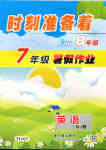题目内容
10.We are becoming slowly aware that our luck ____as Mother Nature hits back at Man's abuse of the environment.( )| A. | is run out | B. | is running out | ||
| C. | is run out of | D. | has been run out |
分析 我们现在慢慢意识到我们的运气快用完了,因为大自然报复了人类对环境的虐待.
解答 答案:B
根据句式,"We are becoming slowly aware"表明事情正在发生还没有结束."that our luck ____"为aware后一个宾语从句,用进行时表示将来."run out"为不及物动词短语,没有被动语态意为"用完,用尽",故选"is running out"表示"快用完了".
点评 本题考查现在进行时表示将来.考生要了解这个用法并牢记一些不及物动词短语.如:run out 和run out of区别等.

练习册系列答案
 时刻准备着暑假作业原子能出版社系列答案
时刻准备着暑假作业原子能出版社系列答案
相关题目
1.---Why are the Woods selling their belongings?
---They to another city.( )
---They to another city.( )
| A. | had moved | B. | have moved | C. | moved | D. | are moving |
19.Recently I bought an ancient vase,_______ was very reasonable.( )
| A. | which price | B. | the price of which | ||
| C. | its price | D. | the price of that |